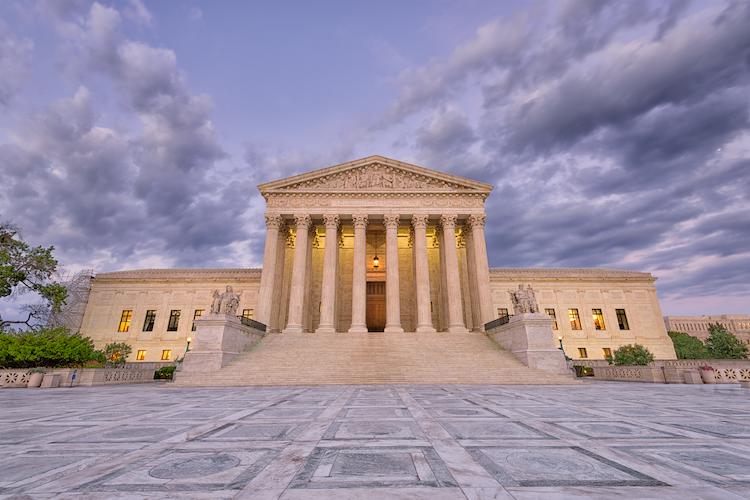SCOTUS Kicks Off New Term With …

The U.S. Supreme Court returns to the bench on October 7, 2024. In the first week of the new term, the justices will hear oral arguments in five cases.
The most closely watched case is Garland v. VanDerStok, which involves so-called “ghost guns.” The term refers guns that are assembled in parts and, therefore, difficult to trace by law enforcement due to their lack serial numbers and transfer records. The lawsuit challenges the Bureau of Alcohol, Tobacco, Firearms, & Explosives’(ATF) “frame or receiver” rule, which seeks to regulate ghost guns as “firearms parts kits.” The rule states that the definition of “firearm” includes weapon parts kits that can be “readily” assembled into a firearm. It further provides that the term “frame or receiver,” as referenced in the Gun Control Act of 1986’s “firearm” definition, includes “a partially complete . . . frame or receiver.”
The specific issues before the justices are: (1) Whether “a weapon parts kit that is designed to or may readily be completed, assembled, restored, or otherwise converted to expel a projectile by the action of an explosive” under 27 C.F.R. § 478.11 is a “firearm” regulated by the Gun Control Act of 1968; and (2) whether “a partially complete, disassembled, or nonfunctional frame or receiver” that is “designed to or may readily be completed, assembled, restored, or otherwise converted to function as a frame or receiver” under 27 C.F.R. § 478.12(c) is a “frame or receiver” regulated by the act.
Below is a brief summary of the other cases before the Court:
Royal Canin U.S.A., Inc. v. Wullschleger: In this jurisdictional case, the Court will determine whether a plaintiff, whose case has been removed to federal court by the defendant, can bring the case back to state court by eliminating all references to federal law. The specific questions the justices have agreed to answer are: “(1) Whether a post-removal amendment of a complaint to omit federal questions defeats federal-question subject matter jurisdiction pursuant to 28 U.S.C. § 1331; and (2) whether such a post-removal amendment of a complaint precludes a district court from exercising supplemental jurisdiction over the plaintiff’s remaining state-law claims pursuant to 28 U.S.C. § 1367.”
Williams v. Washington: The case involves whether a plaintiff must pursue all available administrative remedies through the state prior to bringing a federal civil rights claim. The specific issue before the Court is: “Whether exhaustion of state administrative remedies is required to bring claims under 42 U.S.C. § 1983 in state court.”
Lackey v. Stinnie: The case centers on the award of attorney’s fees following a successful request for a preliminary injunction. The justices have agreed to consider the following questions: “ (1) Whether a party must obtain a ruling that conclusively decides the merits in its favor, as opposed to merely predicting a likelihood of later success, to prevail on the merits under 42 U.S.C. § 1988; and (2) whether a party must obtain an enduring change in the parties’ legal relationship from a judicial act, as opposed to a non-judicial event that moots the case, to prevail under Section 1988.”
Glossip v. Oklahoma: The death penalty case has the support of Oklahoma’s attorney general who agrees that Gossip should be granted a new trial. The questions before the justices include: “(1) Whether the state’s suppression of the key prosecution witness’ admission that he was under the care of a psychiatrist and failure to correct that witness’ false testimony about that care and related diagnosis violate the due process of law under Brady v. Maryland and Napue v. Illinois; (2) whether the entirety of the suppressed evidence must be considered when assessing the materiality of Brady and Napue claims; (3) whether due process of law requires reversal where a capital conviction is so infected with errors that the state no longer seeks to defend it; and (4) whether the Oklahoma Court of Criminal Appeals’ holding that the Oklahoma Post-Conviction Procedure Act precluded post-conviction relief is an adequate and independent state-law ground for the judgment.”
Previous Articles
SCOTUS Decision in Bowe v. United States Is First of the 2026 Term
by DONALD SCARINCI on February 5, 2026
In Bowe v. United States, 607 U.S. ___ (2026), the U.S. Supreme Court held that Title 28 U.S.C. § ...
SCOTUS Rules State Can’t Immunize Parties from Federal Civil Liability
by DONALD SCARINCI on January 29, 2026
In John Doe v. Dynamic Physical Therapy, LLC, 607 U.S. ____ (2025) the U.S. Supreme Court held that...
Supreme Court to Address Racial Discrimination in Jury Selection
by DONALD SCARINCI onWhile the U.S. Supreme Court has concluded oral arguments for the year, it continues to add cases t...
The Amendments
-
Amendment1
- Establishment ClauseFree Exercise Clause
- Freedom of Speech
- Freedoms of Press
- Freedom of Assembly, and Petitition
-
Amendment2
- The Right to Bear Arms
-
Amendment4
- Unreasonable Searches and Seizures
-
Amendment5
- Due Process
- Eminent Domain
- Rights of Criminal Defendants
Preamble to the Bill of Rights
Congress of the United States begun and held at the City of New-York, on Wednesday the fourth of March, one thousand seven hundred and eighty nine.
THE Conventions of a number of the States, having at the time of their adopting the Constitution, expressed a desire, in order to prevent misconstruction or abuse of its powers, that further declaratory and restrictive clauses should be added: And as extending the ground of public confidence in the Government, will best ensure the beneficent ends of its institution.





